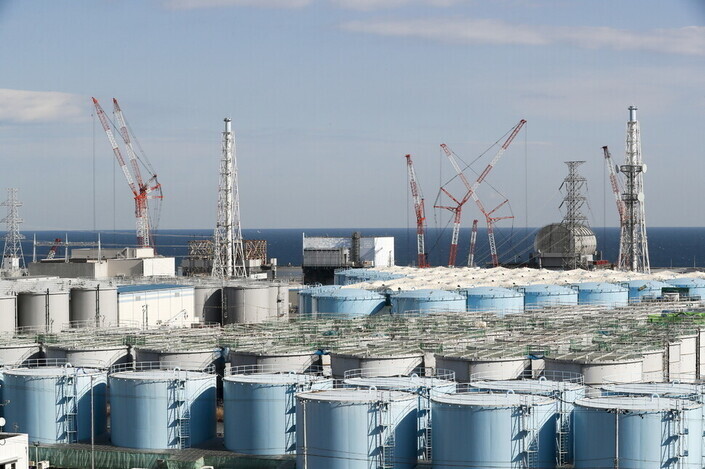hankyoreh
Links to other country sites 다른 나라 사이트 링크
Why did US, IAEA back Japan’s decision to release Fukushima water?

There was some surprise when the US and the International Atomic Energy Agency (IAEA) issued statements in support of the Japanese government’s decision Tuesday to release radioactive water from its Fukushima nuclear plant into the ocean. Why would the US and the IAEA back Japan when its neighbors — including South Korea, China and Russia — fiercely protested the decision?
In a statement on the same day, the IAEA said that “Director General Rafael Mariano Grossi welcomed Japan’s announcement.” To some extent, IAEA’s support had been expected since Grossi has been a cheerleader for Japan. He visited the Fukushima Daiichi Nuclear Power Plant in February 2020 and then praised the Japanese government’s work on the contaminated water in a video message on March 23, 2021.
Established in 1957, the IAEA’s basic policy is expanding nuclear power, despite its emphasis on safety. Considering that the Fukushima nuclear accident raised awareness of the danger of nuclear power worldwide, bringing that accident to a neat conclusion is a shared goal for the Japanese government and the IAEA, environmental groups say. Tokyo and the IAEA are reportedly cooperating closely on the critical goals of decommissioning the Fukushima plant and treating the contaminated water there.
Another factor is that Japan has considerable sway over the IAEA with its highly developed nuclear power industry. According to South Korea’s Ministry of Foreign Affairs data, Japan pays the third-highest dues to the IAEA, covering 8.2% of its budget, after the US (25%) and China (11.6%).
The combined dues paid by the US and Japan, which favor releasing the contaminated water into the ocean, amount to an overwhelming 33.2% share of the IAEA’s budget. South Korea ranks 11th, at 2.2%.
Significantly, the previous director general of the IAEA, Yukiya Amano, was Japanese. Amano led the IAEA for ten years, from 2009 until 2019, shortly before his death.
The US’s sudden statement of support for Japan’s release of the contaminated water came as a surprise to many since the US had made little mention of the issue before that. It was also peculiar that the Biden administration would back a plan that could cause serious harm to the marine ecosystem and to countries in the region that rely on its seafood, since Biden has taken so much interest in climate change and other environmental issues.
The US appears to have sided with Japan on this issue for diplomatic reasons, given its increasing need in recent years for Japan’s cooperation in the containment of China.
Analysts think that the Japanese government’s focus on tritium, which can’t be removed in water treatment, helped it win over the US and the IAEA. Japan isn’t the only country that releases tritium into the ocean; other countries with nuclear power plants, including the US, China, and South Korea, do the same thing, while ensuring that the tritium stays below a level defined by each government. That’s why the IAEA and the US say that Japan’s decision is in accordance with global standards.
But the contaminated water stored in the tanks at Fukushima contains not only tritium but also deadly radioactive materials brought by rainwater and groundwater into the cooling pool holding the nuclear fuel that melted during the accident. While this water has been treated once, about 70% of the water still contains radioactive materials, including cesium, strontium, and iodine.
The Japanese government has promised to treat the contaminated water again to bring those radioactive materials down to a safe level. But it still hasn’t published any details about the outcome of the second round of treatment, which has prompted concerns.
By Kim So-youn, staff reporter
Please direct comments or questions to [english@hani.co.kr]

Editorial・opinion
![[Editorial] Does Yoon think the Korean public is wrong? [Editorial] Does Yoon think the Korean public is wrong?](https://flexible.img.hani.co.kr/flexible/normal/500/300/imgdb/original/2024/0417/8517133419684774.jpg) [Editorial] Does Yoon think the Korean public is wrong?
[Editorial] Does Yoon think the Korean public is wrong?![[Editorial] As it bolsters its alliance with US, Japan must be accountable for past [Editorial] As it bolsters its alliance with US, Japan must be accountable for past](https://flexible.img.hani.co.kr/flexible/normal/500/300/imgdb/original/2024/0417/6817133413968321.jpg) [Editorial] As it bolsters its alliance with US, Japan must be accountable for past
[Editorial] As it bolsters its alliance with US, Japan must be accountable for past- [Guest essay] Amending the Constitution is Yoon’s key to leaving office in public’s good graces
- [Editorial] 10 years on, lessons of Sewol tragedy must never be forgotten
- [Column] A death blow to Korea’s prosecutor politics
- [Correspondent’s column] The US and the end of Japanese pacifism
- [Guest essay] How Korea turned its trainee doctors into monsters
- [Guest essay] As someone who helped forge Seoul-Moscow ties, their status today troubles me
- [Editorial] Koreans sent a loud and clear message to Yoon
- [Column] In Korea’s midterm elections, it’s time for accountability
Most viewed articles
- 1[Column] The clock is ticking for Korea’s first lady
- 2Samsung barricades office as unionized workers strike for better conditions
- 3[Editorial] When the choice is kids or career, Korea will never overcome birth rate woes
- 4S. Korea, Japan reaffirm commitment to strengthening trilateral ties with US
- 5[News analysis] After elections, prosecutorial reform will likely make legislative agenda
- 6Japan officially says compensation of Korean forced laborers isn’t its responsibility
- 7Why Israel isn’t hitting Iran with immediate retaliation
- 8[Editorial] As it bolsters its alliance with US, Japan must be accountable for past
- 9[Editorial] Does Yoon think the Korean public is wrong?
- 10[Guest essay] How Korea turned its trainee doctors into monsters